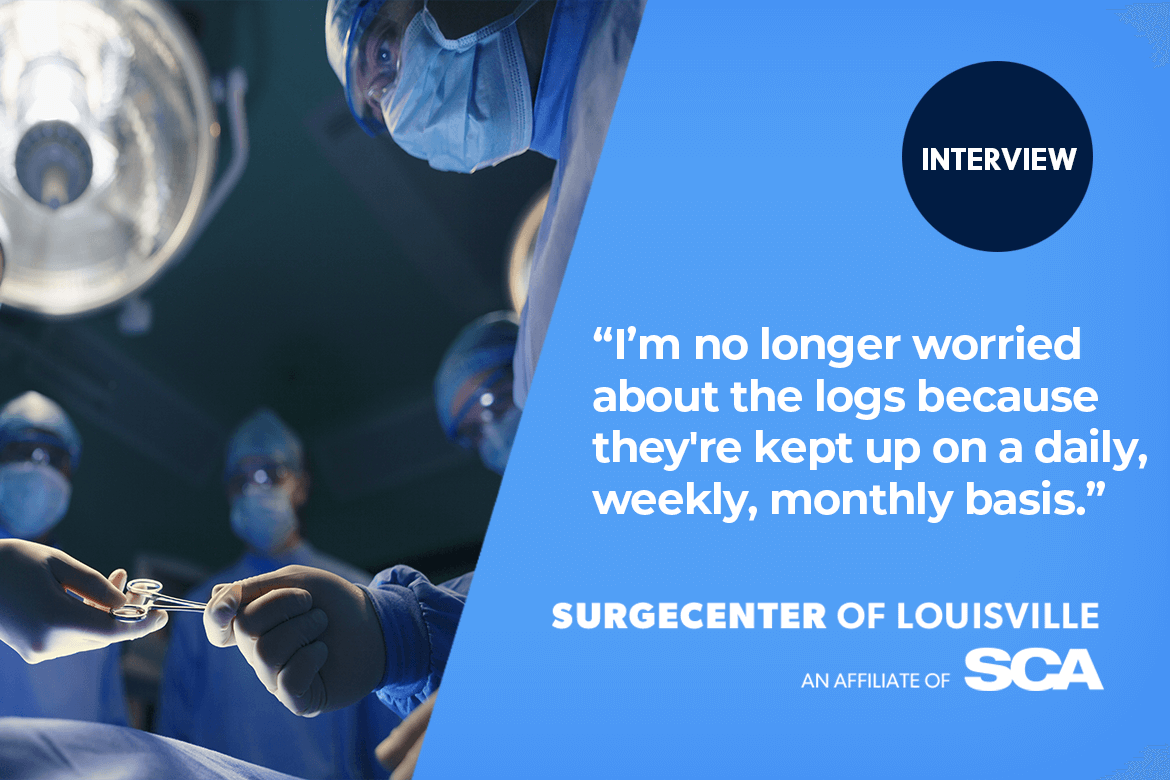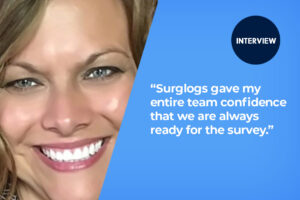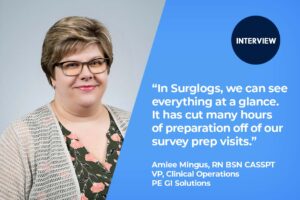The responsibility of regulatory compliance within the environment of care is usually on an administrator or a compliance officer. But in many facilities, it falls on the shoulders of nurses. We’ve spoken with Kristy Norman, Director of Nursing at Surgecenter of Louisville, a 4 OR and 1 PR surgery center, about handling it all.
Kristy, you’re a DON, but at the same time, you also take care of all EOC compliance. How did you manage to get these extra tasks?
It’s kind of fallen on me. My overall position is maintaining accreditation and quality standards. I took it on when our environment of care officer left years ago. Surglogs has made this work tremendously easier.
It sounds like you’re very busy.
Yes, EOC is still a small part of my job.
Could you describe what your compliance-related tasks look like?
We have our daily routines that are done either by me or our two clinical managers, one in OR and one in PACU. One thing we do is the risk assessment audits. I oversee if the staff is doing time-outs appropriately, as well as fall prevention or medication safety. I have several of these that I have to do on a monthly basis. My job changes daily and occasionally I’m in staffing. A lot of times, those are just proactive things like making improvements within the building and process changes.
What motivates you to come to work everyday?
It’s a good job with a great team. The team here really wants to do the right thing and place a focus on patient safety. We also maintain our accreditation, whether it’s CMS coming to audit us or AAAHC. And then of course, if anything happens, we have to look into that, improve processes and mitigate the risk of it ever happening again. This has to be more proactive rather than reactive.
You mentioned your team, how big is it?
We have 45 teammates here and 40 of them are clinical. The clinical staff are all nurses and 6 of them are surgical techs.
How many of your teammates are responsible for logs, checks, etc.?
All of them, plus two managers and myself. I have specific people accountable for different logs. We actually greatly expanded things we keep track of on a daily basis since we switched to Surglogs. Our nurses love to use it.
When we’re talking about EOC logs – what logs are you using?
I am not joking when I say that I probably have a five inch binder for EOC. It’s everything from the monthly ground rounds to med gas checks to vacuum pump checks, blanket warmer, refrigerators, medications, opening/closing cleaning duties, stretcher cleaning, crash carts, you name it. We had a paper for everything and we have now put that all in Surglogs. For example, cleaning was my biggest nemesis. It’s not that the staff didn’t do the job but they didn’t fill in the paper logs and just got started with their day. And then I found out that we’re missing logs, it was very frustrating. I had no doubt they were doing what they were supposed to be doing but it had to be documented as well. It changed when we started using Surglogs.
How big of a problem would it be if a surveyor came and the cleaning logs would be missing?
It would be a huge problem. Now we know we don’t have to scramble with that. It’s all done. From a leadership or management standpoint, you can very quickly go in, look, and see what is done and what is next based on parameters you set. Is it daily? Is it weekly? Is it monthly? I can just look into Surglogs and tell if the person that helps me with the OC has checked the generator this month. I don’t have to ask or go to the back and get a notebook. I just pull it up on my tablet and see if it’s yellow or red. And I know what needs to be done.
Have you already had a survey since you started using Surglogs?
Yes.
What does your preparation for the survey look like?
I’m no longer worried about the logs because they’re kept up on a daily, weekly, monthly basis. Surglogs gave me much more peace of mind and I can now focus more on different things, like education and performance improvement projects and processes.
How different were survey preparations when you were still using pen-and-paper?
I would have to do the quality checks prior to the Quality Meetings. Every quarter, I would go around and I would collect all the papers. I would just go in and verify that things were filled out. If they weren’t filled out, I was chasing people down to get those logs completed, which was really very time consuming. I chose to do it quarterly because I didn’t have time to deal with it monthly, then it would go in my five inch binder.
How did the survey look with Surglogs?
When we had our AAAHC survey in November 2020, the surveyor that walked around with me was just floored. She absolutely thought it was the neatest thing. She really liked Surglogs. I’ve been through a lot of surveys, and I feel like if they know that you have processes in place or certain things in place, they tend to not ask a lot of questions. And that was what I encountered.
How much time have you saved from a paper to a digital solution?
You don’t have a choice to track compliance or not. But it’s a big difference to just check it daily from my tablet versus having to pull things monthly or quarterly and realizing “oh my gosh, this wasn’t done”. Surglogs saved me a lot of time, but I can’t put a number on it.


